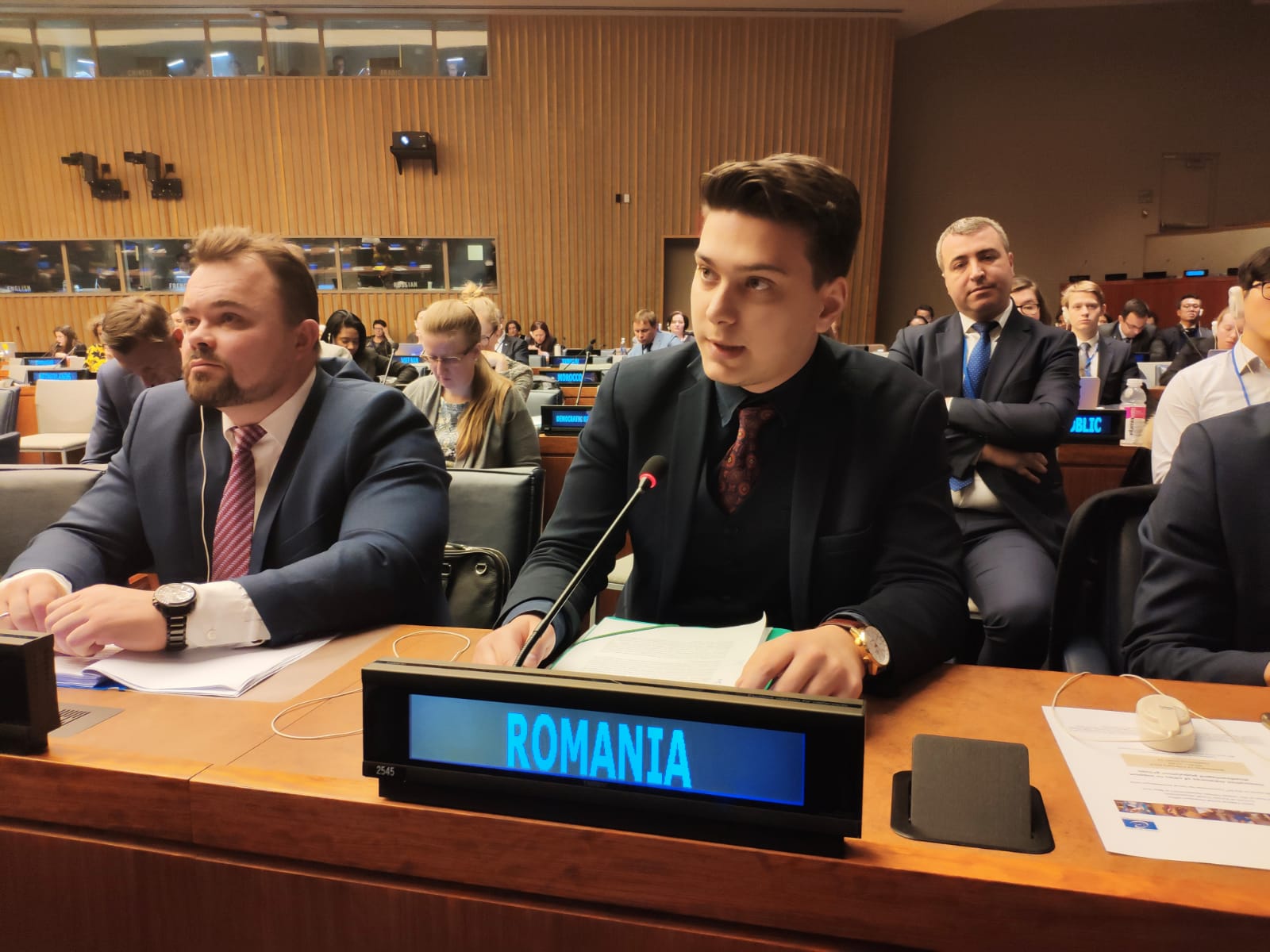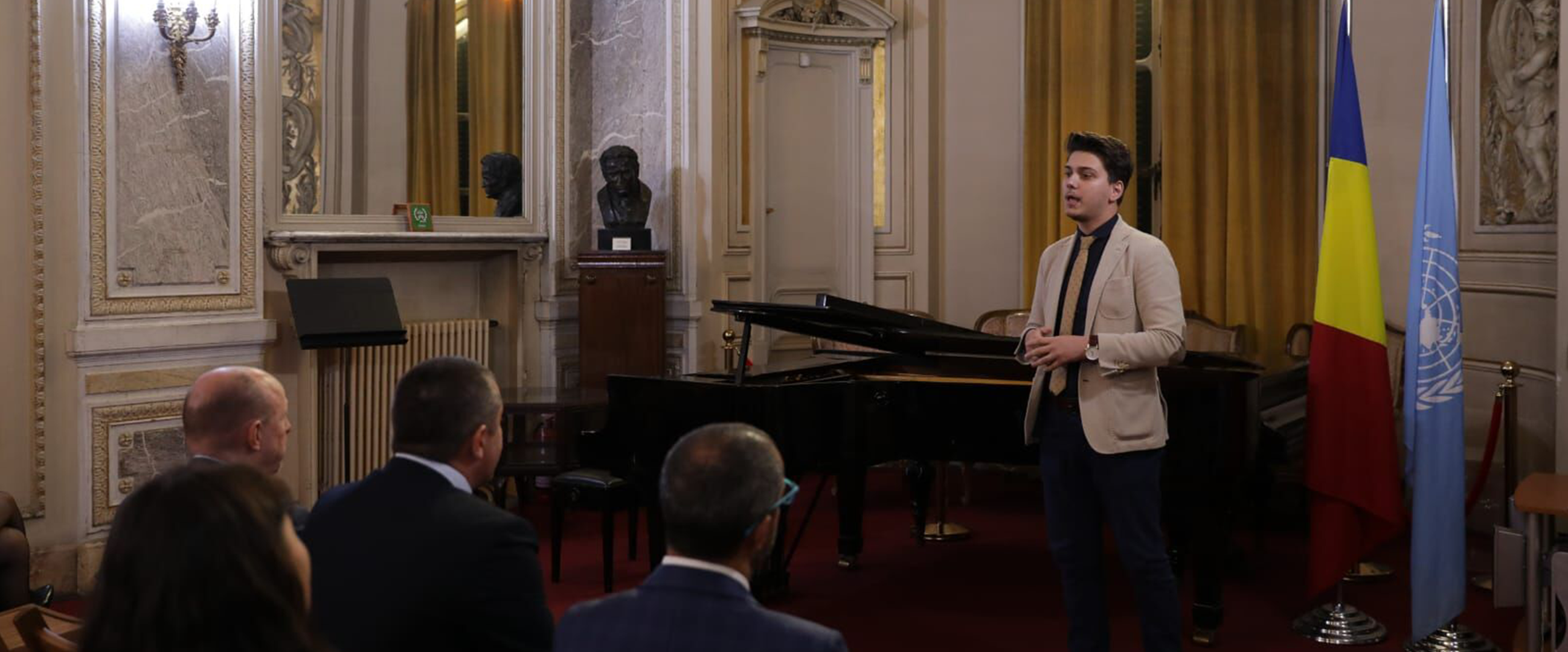Editor’s note: When Aurelian Dragoș Mohan isn’t representing Romania as a United Nations Youth Delegate, he is a masters student, studying comparative politics at the University of Bucharest. He is an alumnus of the Elie Wiesel Study Tour, a program sponsored by the US Embassy in Romania and implemented by American Councils, with the support of the Embassy of Israel in Romania and Elie Wiesel National Institute for the Study of Holocaust in Romania. Mr. Mohan was selected as one of two UN youth delegates from Romania last year after a multi-stage selection process. As a youth delegate, he has given several speeches on the UN floor and as his time as a delegate winds down, he looks forward to implementing several new projects in his home country.
What made you want to apply for the Elie Wiesel Study Tour?
Even in high school I had a propensity for social science and humanities. Both history and philosophy played a major role in my academic and intellectual formation. It was a certainty that the Elie Wiesel Study Tour would not only provide the opportunity to visit multiple historic locations that are of paramount importance for any scholar interested in World War II, but it would also nurture a knowledge-based milieu conducive to specialization in the field of the Holocaust. The possibility to improve my knowledge on the topics of WWII and the Holocaust was my main incentive to apply. I also had an interest in working and debating with a myriad of students and experts on these subjects.
Why are programs like these valuable?
The academic value of an event like this is incommensurable because (a) it represents a robust platform for the dissemination of knowledge, (b) acquaints students with structured, academic debate, (c) brings together young people from multiple social and economic backgrounds, and (d) equips participants with critical thinking, teamwork, and research abilities. Furthermore, by giving youth the chance to directly experience the sites where history has taken place, a well-organized study tour can act as a bridge between bygone eras, generations, communities, and even countries. Only these enterprises prove effective in the task of persuading people that they must learn from the past in order to avoid repeating it. For example, the scale and the consequences of an ethnic conflict can sometimes be grasped only after visiting the areas where atrocities occurred.
Give us an overview of your work as a UN Youth Delegate:
In my official capacity as the United Nations Youth Delegate of Romania I had the honor to deliver two speeches at the UN: one during the 73rd Session of the UN General Assembly (UNGA) and the other one during the 57th Commission for Social Development of the UN Economic and Social Council. The discourses were aimed at presenting both the status quo of Romanian youth and the main ameliorative policies my colleague and I recommend to national decision-makers. 
I represented six million young people at the side events and plenary sessions pertaining to the aforementioned UN activities. I also collaborated with my fellow youth delegates and several UN agencies in order to identify best practices and disseminate them. Moreover, I organized various conferences, workshops, and training sessions at the national level with the purpose of popularizing the Agenda 2030 and raising awareness regarding the importance of the Sustainable Development Goals.
In addition, I was able to work with all major youth stakeholders from my country and from the United Nations with the aim of fostering an environment favorable to the progress of young people. Nowadays, I am working at an online platform encompassing youth-related documents from global sources, which will help young Romanians to readily access information. In just a couple of days, another project will commence: the UN Youth Delegates of Romania will publish a guide meant to help women tackle sexual harassment and different types of maltreatment.
What has been the best part of being one of the UN Youth Delegates for Romania?
The entire United Nations experience is overwhelming. Hence, to identify the best part of it can be a strenuous task. Nevertheless, nothing can match the significance of encountering and discussing with the UN Secretary General. I can still recall the moment when António Guterres, the ninth UN SG, suggested to do our best to bring the young people as close as possible to the UN and to strive for a better involvement of youth in the policymaking process because we, as youth delegates, are the prominent representatives of this demographic group at the UN.
Additionally, to address 193 countries in the UN General Assembly on issues related to your generation and to share your ideas with numerous diplomats is one of the most astonishing things a person can do in his/her life. In my case, both occurrences, the discussion with the SG and the UNGA speech, are equally momentous.
How are you planning to apply what you’ve learned through this experience when you return home?
After the completion of my official mandate, I will continue to advocate, as a UN Habitat Task Force leader, for the inclusion of young people in the decision-making process and for the elevation of their role from sole participation to co-management and co-decision-making in relation to public policy at local and national level. In addition, I will do my best in order to foster an environment conducive to the progress of young people and to help them become relevant stakeholders capable of setting the agenda of political leaders.
Furthermore, I will use my experience at the United Nations, in conjunction with my knowledge as a political scientist, in future endeavors that will aim at influencing and outlining national policies.
Why is civic engagement important, especially for young people?
We need to understand that civic engagement is a conditio sine qua non—an indispensable condition—for progress. Our own community or country cannot devise coherent policies if one of the most important groups—the young people—are excluded from the process. If civic engagement is high, then policymakers will have a better understanding of the issues pertaining to each community and citizens will play a significant role in shaping local public policy. Moreover, civic engagement enterprises nurture teamwork, research, negotiation, and public speaking capabilities. These skills are created during any undertaking specific to the field of civic engagement, no matter what form it takes.
Civic engagement can foster both comprehensively developed individuals and sustainable communities.
Watch Mr. Mohan present at the UN here and below:
About the Elie Wiesel Study Tour
Elie Wiesel was a Romanian-born Holocaust survivor who became a writer, professor, and political activist, speaking out about the horrors he lived through until his death in 2016. He was awarded the Nobel Peace Prize in 1986. The Elie Wiesel Study Tour was funded by a grant from the US Embassy in Romania to help young Romanians (aged 18-25) better understand the history of the Holocaust through discovering the life and work of Elie Wiesel. The tour includes a visit to Auschwitz and the Schindler Factory in Poland and the Elie Wiesel Memorial House in Romania. Following the program, which included discussions, movies, and thematic workshops, participants hold follow-up activities in their schools, universities, and local communities.

